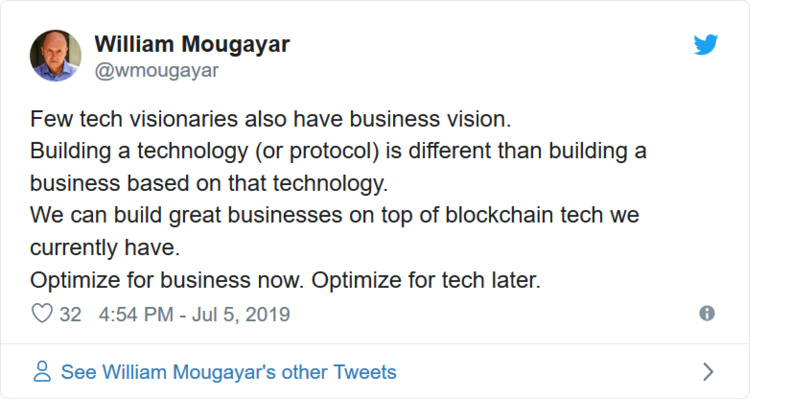What will move the blockchain to the masses? A trillion dollar question
09/07/2019
It depends who you ask.
Most blockchain technologists (those working on protocol, Layer 1 and Layer 2 levels) will probably tell you that better blockchain technology is on the way, because that’s what they are working on.
Applications developers are more pragmatic, as they are more interested in applying blockchain technology, but they have to work with what is handed to them from the Layer 1 and 2 front lines.
Truth is, few technology visionaries have enough business vision of the kind that would seek to disrupt existing business models. They only have a vague idea and make assumptions about what the technology could enable.
I recently tweeted this related thought:
Fred Wilson believes that “the primary inhibitor to (this) business model innovation is that it requires users to own crypto-assets and store them in a wallet somewhere and be comfortable using them to access decentralized apps.”
But I don’t think that friendly wallets are the only key thing that is holding users from switching to crypto-based apps, even if we give them to carrot of getting rewarded for their time or efforts. Steemit had a very easy to use built-in wallet that came automatically by signing-up, yet its usage plateaued (for a variety of reasons).
Certainly, more user-friendly experiences via compelling User Interfaces are a necessary, but not sufficient condition. From an “incentive to move” point of view, here are 5 primary (strategic) factors that are in play:
– The benefits of owning one’s data
– Being rewarded for time/value provided online
– The promise of better governance
– Something totally new we couldn’t do before
– Being forced to use crypto
Owning Your Own Data
Individual self-sovereignty is a blockchain promise and one of its best value propositions. Whether it’s about owning the keys to your own wallet (hence being your own bank), having absolute control of your own data (and how it is used by others), or tightening the screws on overall privacy of your online presence and actions, most users would opt for self-control. Unfortunately, the self-managed solutions are not that elegant yet, nor that easy to use.
Being Rewarded in Tokens
I’ve written a lot about how users can now be rewarded with tokens, for a variety of work they are doing, or data they are providing, and arguably it could be the future of (online) work, as we know it. Steemit is the poster child for that model, and other cryptocurrencies such as Kin also enable similar capabilities for a variety of popular apps. I believe we are still scratching the surface on what’s possible in this area.
Promise of Better Governance
Decentralization is a core blockchain theme. A related promise that is lurking on the horizon is decentralized (operations) governance, enabled by blockchain technology. Currently, many central actors have a lot of flaws. As they become big and powerful, companies start to be perceived as being unfair, corrupt, untrustworthy, evil, abusive, inefficient, expensive, or plain useless. These shortcomings could be remedied by a more evenly measured (decentralized) form of governance about their policies and operating principles. Again, more promise than reality at this point, but so goes the theory.
The New New
On the novelty scale, nothing beats seeing the birth of something that didn’t exist before. It is hoped that the blockchain will give us many such novelties, and one of them is the advent of non-fungible assets, popularized by CryptoKitties, the quintessential game that pioneered this concept. CryptoKitties, and other native crypto-based assets have no physical (or online) world equivalent. They are totally germaine to blockchains, enabled by the unique capability of mitigating the double-transfer problem: being able to transfer a unique digital asset from one user to another at the same time as transferring its unique ownership, unlike transferring a photo from my smartphone and still owning it, after the recipient receives it.
Do or Else
Giving narrow choices to users is a common tactic that is practiced by large companies that boast a captive user base. The scenario looks like this: a default cryptocurrency is embedded into a given app, and it becomes the only choice for users. A primary example will be the Libra currency when it suddenly appears inside WhatsApp, Instagram or Facebook streams. Its utility will be instant, and users will be almost “forced” to use it in order to unlock what it offers.
Regardless of which one of the above conditions hits them first, and the ones they choose to pursue, for users, the incentive to move will depend on their psychological predisposition to change: People are risk-averse in the domain of gains, and they are risk-seeking in the domain of losses.
That statement is based on the Prospect Theory that was first developed by Daniel Kahneman (who later won a Nobel Prize in Economics for this specific work), and Amos Tversky in their 1979 seminal paper, “Prospect Theory: An Analysis of Decision under Risk”.
In order to edge towards mass adoption of blockchain technology, let’s keep asking how can the blockchain answer fundamental (pain) questions such as:
– What are we missing out on? (eg. lower transaction fees)
– What are the pains? (eg. difficult money transfers)
– What are the threats? (eg. someone taking/misusing our data)
– What are the risks? (eg. not being rewarded for time we spend online)
– Where are we most vulnerable? (eg. missing out on income)
And just like the Web’s progression, it will be a gradual, step-wise process. There is no blockchain silver bullet, but nothing will happen without easier user experiences.
FINYEAR & CHAINEUM
Recevez chaque matin par mail la newsletter Finyear, une sélection quotidienne des meilleures infos et expertises en finance digitale, corporate finance & crypto finance.
Read for free The daily newspaper Finyear & its daily newsletter.
Receive the Finyear’s newsletter every morning by email, a daily snapshot of the best news and expertise in digital finance, corporate finance & crypto finance.
————————
Chaineum :
Fondée en 2015, Chaineum est un cabinet de conseil en opérations de haut de bilan offrant une expertise de premier plan en matière d’ICO et STO, avec une vision stratégique orientée tant vers le métier de ses clients que sur la technologie blockchain. A ce titre, Chaineum a participé à la mise en œuvre de bonnes pratiques dans le secteur (ICO Charter, Security Token Network).
La division services blockchain de Chaineum, développe la technologie Chaineum Segment, une blockchain privée orientée objets.
About Chaineum:
Founded in 2015, Chaineum is a leading corporate finance advisory firm with a strong expertise in ICO and STO, and a strategic focus on both its clients’ business and blockchain technology. As such, Chaineum paved the way in the implementation of certain best practices in this sector (ICO Charter, Security Token Network).
Chaineum’s blockchain services division, is developing Chaineum Segment technology, an object-oriented private blockchain.
————————-
No Offer, Solicitation, Investment Advice, or Recommendations
No reference to any specific security constitutes a recommendation to buy, sell or hold that security or any other security.
Nothing on this website shall be considered a solicitation or offer to buy or sell any security, future, option or other financial instrument or to offer or provide any investment advice or service to any person in any jurisdiction.
Nothing contained on the website constitutes investment advice or offers any opinion with respect to the suitability of any security, and the views expressed on this website should not be taken as advice to buy, sell or hold any security. In preparing the information contained in this website, we have not taken into account the investment needs, objectives and financial circumstances of any particular investor.
This information has no regard to the specific investment objectives, financial situation and particular needs of any specific recipient of this information and investments discussed may not be suitable for all investors.
Any views expressed on this website by us were prepared based upon the information available to us at the time such views were written. Changed or additional information could cause such views to change.
All information is subject to possible correction. Information may quickly become unreliable for various reasons, including changes in market conditions or economic circumstances.





